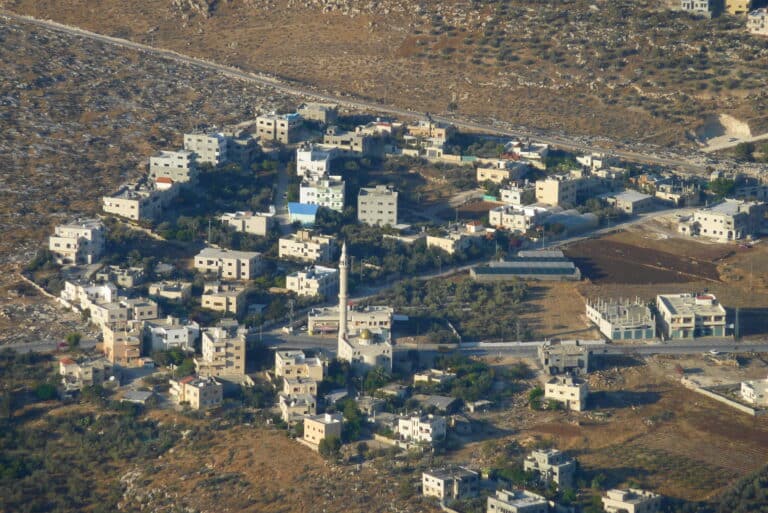
What Happened
Last Wednesday, May 15, Palestinians marked the day of Nakba, or “catastrophe,” of the establishment of the State of Israel on May 14, 1948. More than 10,000 Gazans rioted on the Gaza border throughout the day. A Hamas leader, Fathi Hamad, said in a speech:
“The day of your slaughter, extermination and demise is approaching. We came to tell the Zionist enemy, its men, army, government and Knesset: ‘Go away from us.’ All of you should look for a place in Europe…hell, the sea, the ocean or the Bermuda Triangle. There is no place for all of you in Palestine. There is no place for you in the land of Jerusalem.”
While Israelis celebrate Yom Ha’atzmaut around this time, Palestinians remember May of 1948 as the beginning of a 71-year-and-counting struggle to repossess their rightful land.
Background
In Jewish memory, May of 1948 stands out as a miraculous, momentous occasion during which Jews became sovereign in their homeland for the first time in 2,000 years. Jews fled centuries of persecution and the atrocities of the Holocaust and recreated the Jewish state in an unprecedented way. We mark the day in Israel and in Jewish communities around the world with celebrations. This is our story, and we have every right to take pride in it. On the other hand, we know that present-day Israel is wrapped up in complexities. Part of understanding the issues at hand, and hopefully solving them, involves understanding the different sides of the Arab-Israeli and Palestinian-Israeli conflict. We will all be the wiser, and kinder, for it.
It is certainly true that nearly 700,000 Palestinian Arabs left the area (either fled or expelled in some cases), and it is also true we should widen the lens. Read Ben-Dror Yemini’s What about the Jewish Nakba and ensure your students think through whether or not the Jewish Nakba should be acknowledged. Israel began commemorating the Jews who were expelled from Arab and Muslim countries. Should Jewish educational communities begin to mark this day? Should Arab countries recognize this?
For nearly 2,000 years, Jews did not live as a majority and were always minorities in various lands. Jews had not lived as the authority in power for thousands of years. Harvard professor Ruth Wisse discusses this idea and challenges us to consider what it means for Jews to have power, and how American Jews are typically uncomfortable with this idea in a way Israeli Jews are not. For centuries, Jews lived in Arab countries as the minority, and now Arabs began to live in Israel as the minority. Jewish power and the usage of it, as well as the new position the Arab community faced, should be considered.
“Nakba Day” matters to grapple with:
Practical, not just academic
Michael Oren notes that “Great wars in history eventually became great wars about history.” Although other historical disputes vie for space on bookshelves, in the context of the Arab-Israeli dispute, the ferociousness of the debate for what happened has a “profound impact on the lives of millions of people: Israel’s security, the rights of Palestinian refugees, the future of Jerusalem.” That’s why Geoffrey Wheatcroft has described this as “The single most bitterly contentious communal struggle on earth today.”
This conflict seems to be unlike any other. How? Is that true?
The impact on Palestinian Identity
Raja Shehadeh, in Where the Line is Drawn, writes, “Israel had succeeded in forging a national identity and Palestine had not. The Nakba had effectively dismantled Palestinian identity.” Living under Jordanian regime from 1948-1967, Shehadeh notes that Palestinian culture and identity were suppressed, and they were told to be loyal subjects to the Hashemite king. He continues by saying:
“I grew up feeling only hostility toward the Jordanian regime. Even when I didn’t know what it meant to be a Palestinian, I knew I was not Jordanian. Meanwhile, the Israeli army was forging a nation identity for the youth. I wished we had an army that could take the burden of having to create my own identity off my hands. How comforting it would be to have an institution like the military to mould our self-image and national identity…”
Compare and contrast how Israeli and Palestinian identities were shaped during Israel’s early years.
Israel’s role?
As Daniel Gordis notes in his book, Israel: A Concise History of a Nation Reborn, that at the end of Israel’s War of Independence, “The biggest losers in the conflict were Palestine’s Arabs” (190). Whether or not Israel played a major role in their displacement is subject to serious historical dispute, which often becomes more about ideology than objective history, but Gordis concludes, “Israel, had, without doubt, played a role in their displacement.”
Should Israel acknowledge this? If so, how? If not, why not?
The role of Arab countries?
Gordis continues, “the decision of the new host countries to deliberately perpetuate their homelessness to foment international condemnation of Israel” is what turned the Palestinian plight into a “genuine human tragedy.” When one contrasts how Israel treated homeless Jews, hundreds of thousands of whom were exiled from Arab countries and contrast it with how Palestinian Arabs were treated in Lebanon, Syria, Egypt, and Jordan, one can easily understand how these different responses led to a difference in the future of both populations.
Can Arab countries admit their role?
Originally Published Mar 21, 2019 09:36PM EDT
